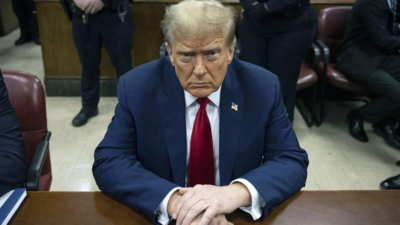President-elect Donald Trump was sentenced on Friday in the New York hush money case. The presiding judge, Juan M Merchan, imposed an unconditional discharge, concluding the case without jail time, fines, or probation.
The judgment comes after Trump was found guilty on 34 counts of falsifying business records in connection to a $130,000 hush money payment to adult film star Stormy Daniels during the 2016 presidential campaign. Trump, who has consistently denied the allegations, labelled the case a “political witch hunt” and vowed to appeal the conviction.
During a brief virtual appearance from his Mar-a-Lago residence, Trump reiterated his innocence, stating, “It’s been a political witch hunt. It was done to damage my reputation so that I would lose the election, and, obviously, that didn’t work.” His legal team, alongside prosecutors, supported the no-penalty sentence, acknowledging the challenges of enforcing punitive measures against a president-elect.
Judge Merchan, explaining his rationale, said: “Despite the extraordinary breadth of [presidential] legal protections, one power they do not provide is that they do not erase a jury verdict.” The judge also cited the importance of “finality” and ensuring Trump’s ability to pursue appellate options without hindrance.
What it means for Trump
Trump’s conviction carries significant implications, even without punitive measures. Below are key takeaways:
- Voting rights: Trump retains his ability to vote in Florida, as the state restores voting rights after sentencing. His rights remain unaffected unless explicitly revoked in New York, where his conviction occurred.
- Gun ownership: Under federal law, Trump is barred from possessing firearms due to his felony conviction.
- DNA sample: As required by New York law, Trump must provide a DNA sample for the state’s crime databank. This involves a simple cheek swab to assist in criminal investigations.
- Holding office: Federal law does not prevent Trump from assuming the presidency despite his conviction. He remains eligible to hold federal office.
- International travel: Trump retains his diplomatic and regular passports, allowing him to travel abroad, though some countries may impose restrictions on individuals with felony convictions.
- Business licenses: His conviction could impact ventures requiring specific licenses, such as liquor and gaming permits, though his properties operate under corporate entities that may shield him from direct repercussions.
- Only New York’s governor can pardon Trump for this state conviction.
What is unconditional discharge?
An unconditional discharge is a legal sentence where a defendant is convicted but receives no penalties such as jail time, fines, or probation. In Trump’s case, the sentence reflects the court’s consideration of constitutional concerns and practical challenges.
Judge Merchan indicated his to give the president-elect an unconditional discharge in his order on January 3, saying: “A sentence of an unconditional discharge appears to be the most viable solution to ensure finality and allow Defendant to pursue his appellate options.” Such a sentence is rare for felony convictions and underscores the unique legal and political complexities surrounding the president-elect.
Under New York law, a sentence of unconditional discharge allows a defendant to be released without any conditions, such as imprisonment, fines, or probation. This sentence may be imposed when the court determines that no proper purpose would be served by attaching conditions to the defendant’s release.
For felony convictions, the court must explicitly record its reasons for choosing an unconditional discharge. Importantly, this sentence represents a final judgment of conviction, meaning the case is fully resolved without further obligations on the defendant.




